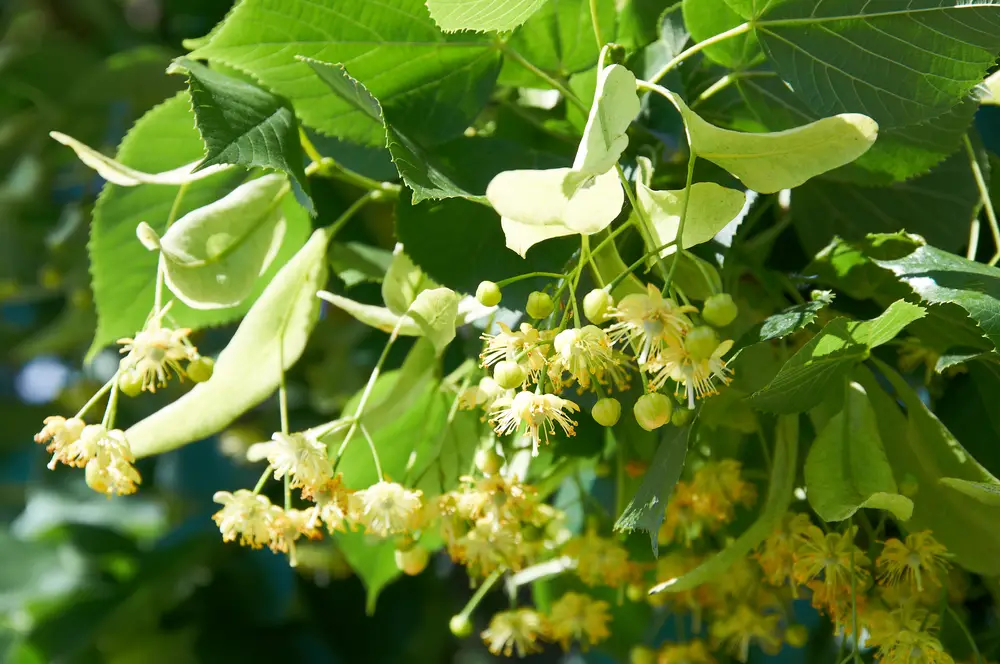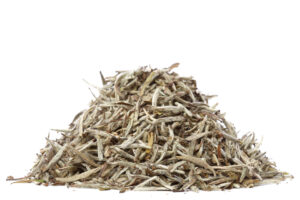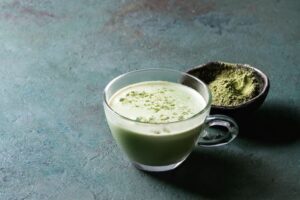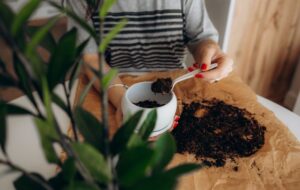So what is this mysterious Linden flower, and what are the Linden Flower Tea benefits?
Linden flower, otherwise known as the European Linden tree, Lime or Basswood, its leaves make for an intriguing and healing cup of tea that’s loaded with health benefits.
With so many benefits to run through, we thought it would be worth looking at Linden tea a little more closely to see what it’s all about.
In this article, we’ll be exploring the history of Linden tea, the benefits and cautions around drinking it, and of course, how best to prepare a wonderful cuppa.
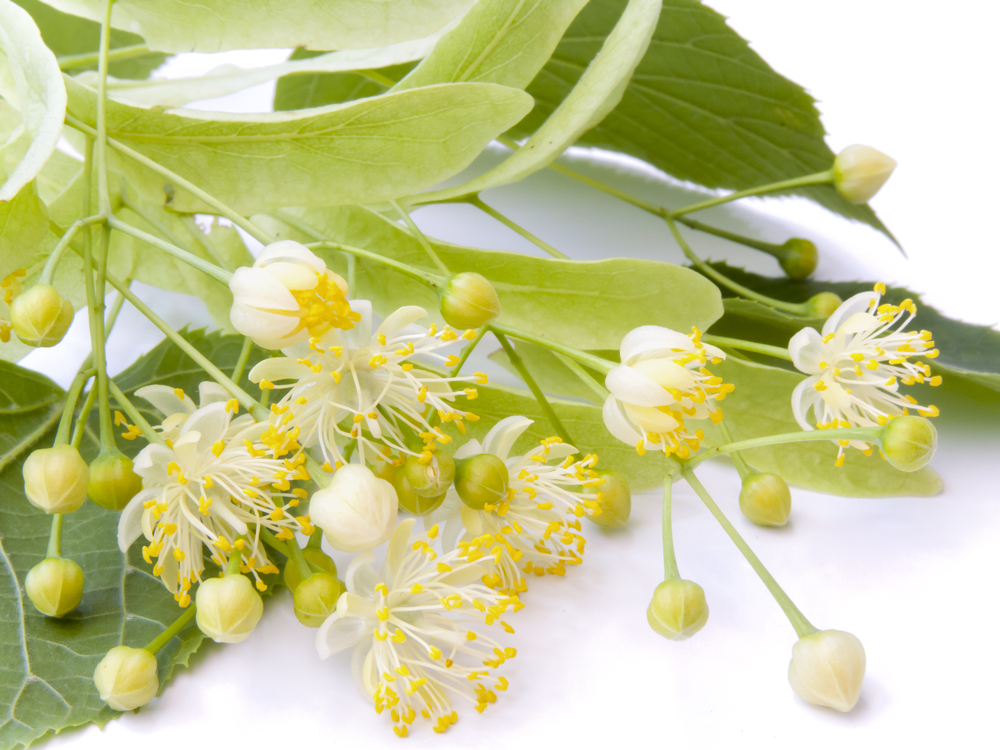
A Quick History of Linden Tea
Of the various members of this genus, the Tilia Cordata boasts the strongest set of medicinal benefits, and it grows throughout Western Asia and Europe.
The Linden tree can grow to an amazing 80 feet in height, making for an impressive sight before delving into its blooms for a warm brew.
The Linden tree is also highly fragrant, with many saying that the scent appears long before the tree comes into view.
Historically, Linden tea has been called the ‘Nectar of the Kings’ due to its widespread use for medicinal purposes.
Its medical history is well known from the days of native Indians from North America, who harnessed its sedative powers through to Europeans in the middle ages using it as a daily heart and health medicine.
There are even rumors that Linden tea was employed during WWII to keep soldiers calm.
How Linden Tea is Processed
Linden flower tea can be made from different tree species, including Tilia Platyphyllos and Tilia Tomentosa.
To create this tea, the flowers of the Linden trees are plucked and subsequently dried out, resulting in sticky and easily-ground pieces.
To know when the Linden flowers are ready to pick, growers wait until they have fully bloomed and are yellow in color.
In some cases, the bark of the tree may also be used to brew up a pot; however, this does not deliver the same flavor and may leave the palate with a more earthy tone.
The Benefits of Linden Flower Tea
Let’s look at some of the health benefits of Linden tea.
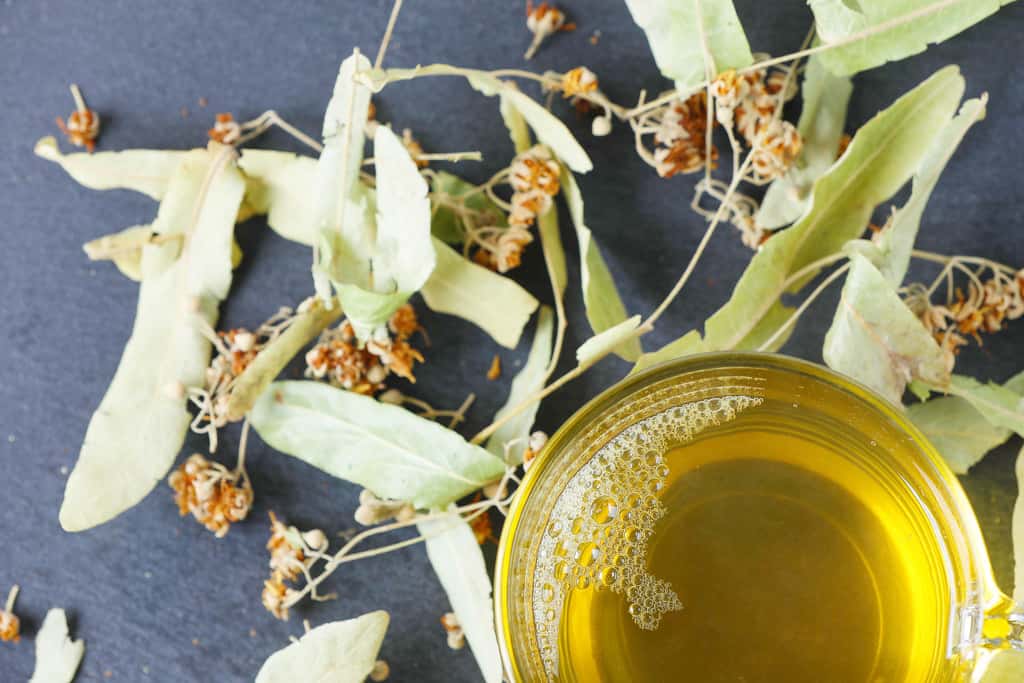
1. Anxiety
Scientific evidence shows that Linden tea can reduce stress and anxiety and has been used as a calming sedative for centuries.
This herbal tea helps to regulate mood swings and in some cases, it may also have a small effect on hormonal health.
After a warm cuppa, drinkers can expect to feel an overall sense of relaxation in both body and mind.
2. Digestion
If indigestion is a regular issue, a cup of Linden tea may be just the ticket to soothe an irritated digestive tract.
Research shows that the antispasmodic quality of Linden tea can also help to reduce stomach cramps and can increase a waning appetite.
Therefore, herbal tea when the stomach starts acting up can help ease these symptoms while also providing a sweet distraction from the discomfort.
3. Hypertension
Due to the diuretic properties of the drink, Linden tea can help lower blood pressure levels.
While it’s not a cure for heart disease, the calming effect it has on the nervous system also assists in preventing blood pressure levels from soaring during stressful times.
Although not a replacement for blood pressure medication, the tea cannot harm when taking a quiet moment to sip away the anxiety.
4. Detox Drink
Linden tea is also known for its antioxidant properties. It contains compounds such as quercetin and kaempferol – powerful allies in the fight against free radicals that emerge due to sun damage or aging.
Another health benefit of the numerous compounds in the tea is that as a diaphoretic, it promotes sweating which ultimately helps the body eliminate toxins, salt, water, and in some cases, fat cells.
5. Immune Booster
As mentioned, this Linden tea can induce sweating, which is often a remedy to break a fever. Above that, Linden tea can be used to help with common colds and flu, thanks to its anti-inflammatory properties.
How to Make Linden Leaf Tea
Making the perfect Linden leaf tea is not so different from other teas, but does have a few nuances. Here’s how to make the perfect cup of this Tilia treat.
What you’ll need:
- 15g or 2-4 teaspoons of dried leaves, flowers, bark or a mixture of all three. Fresh flowers and leaves may also be used, but in smaller quantities. The amount of product used may be decreased or increased based on taste, as the perfect cuppa is always subjective
- Boiling water at about 100°C or 212 °F
- A teapot, preferably ceramic but there is no set rule
- Honey or sweetener to taste
To make the tea, add the dried ingredients to a teapot and cover it with boiling water.
Steep the brew for up to 15 minutes until the tea turns an amber color. Pour into a cup and sweeten with honey or sugar if desired.
Once properly brewed, your Linden tea will have a sweet, herbal fragrance with a strong taste that pleasantly lingers on the palate, making this an excellent tea to have on its own or an addition to other bitter teas to temper the taste.
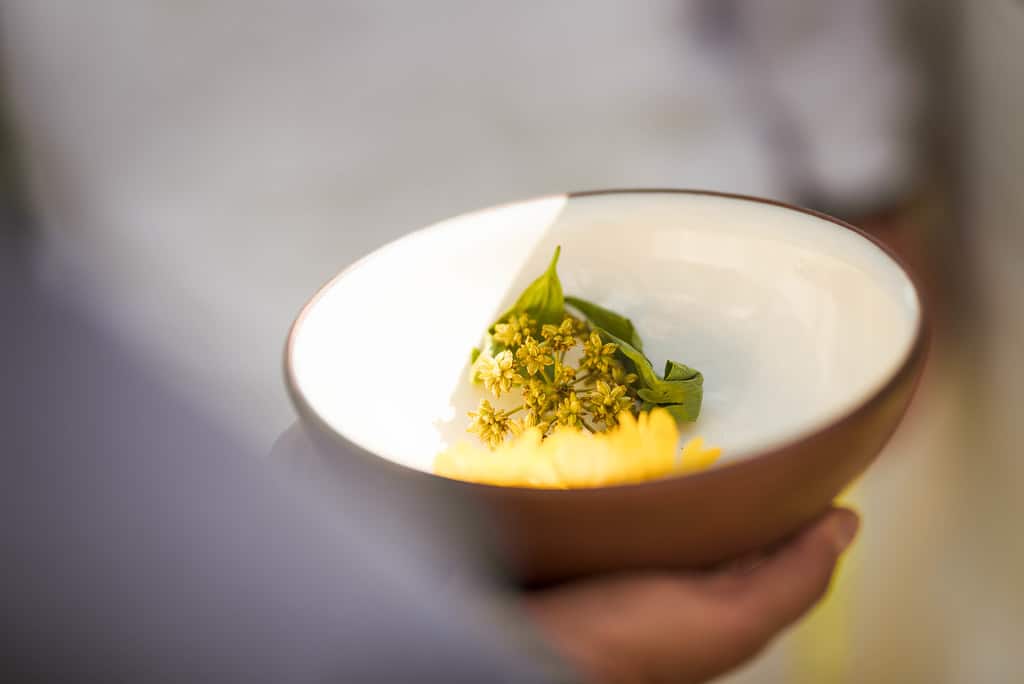
Some Of Our Favorites
There are many different linden tea brands out there, but we’re happy to recommend:
Starwest Botanicals – for a generous pack of loose-leaf goodness
Traditional Medicinals Organic Relaxation Tea – blended with other herbs and flowers to help you get a good night’s sleep.
Tadin Herb & Tea Co. Linden Herbal Tea – for naturally caffeine-free and high-quality tea bags.
Things To Be Careful Of
Note: Some people have reported allergies to the Linden flower, so it is always advisable to speak to a healthcare provider before taking any alternative medicine or drinking a new type of tea if you’re allergy-prone.
If an allergy is suspected, or you experience side effects, do not tempt fate, and do not drink herbal teas or the Linden flower when pregnant.
Linden Flower Tea is meant to soothe the mind, and every so often, it boasts a few body benefits but is not a replacement for proper medical care and intervention when it comes to serious conditions.
Additional Linden Tea Benefits
While very popular as a health drink, Linden can be used for more than just a cup of herbal tea.
Take a warm linden flower bath to let the sweet aroma help you soak away the day, or look out for the extract in some of your favorite beauty products.
Using a Linden flower tincture on inflamed skin can also help to reduce itching, providing much-needed relief from bug bites or rashes.
Linden tea is widely available, but it is always advisable to check the packaging for any compounds that may have been added to the herbal brew such as caffeine or other teas.
For those with an adventurous palate, look for mixed brews containing Linden flowers – for example, the popular Seven Flowers tea.
Whether looking for a sweet fix, something soothing, or a refreshing departure from your regular cuppa, Linden flower tea is a wonderfully relaxing drink that works well on almost any palate.
Let Loose With Linden Tea
Hopefully, we’ve convinced you that Linden flower tea is a great choice for your heart, mind, and overall health.
This herbal healer is easy to find anywhere, and if you have a Linden tree near you, go ahead and harvest your own from the bark or the flowers.
The health effects are clear, the taste is great, and the research backs it up.
Remember, this is not recommended as a replacement for your usual medications but can help relieve inflammation and low energy, amongst other things.
Remember to be safe and measured in your use, and just like with other herbal supplements, do your research to make sure it’s safe to use.

